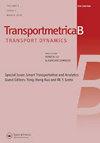Full-scale spatio-temporal traffic flow estimation for city-wide networks: a transfer learning based approach
IF 3.4
2区 工程技术
Q2 TRANSPORTATION
引用次数: 7
Abstract
The full-scale spatio-temporal traffic flow estimation/prediction has always been a hot spot in transportation engineering. The low coverage rate of detectors in transport networks brings difficulties to the city-wide traffic flow estimation/prediction. Moreover, it is difficult for traditional analytical traffic flow models to deal with the traffic flow estimation/prediction problem over urban transport networks in a complex environment. Current data-driven methods mainly focus on road segments with detectors. An instance-based transfer learning method is proposed to estimate network-wide traffic flows including road segments without detectors. Case studies based on simulation data and empirical data collected from the open-source PeMS database are conducted to verify its effectiveness. For the traffic flow estimation of segments without detectors, the mean absolute percentage error (MAPE) is approximately 11% for both datasets, which is superior to the existing methods in the literature and reduces MAPE by two percentage points.基于迁移学习的城市网络全尺度时空交通流量估计方法
本文章由计算机程序翻译,如有差异,请以英文原文为准。
求助全文
约1分钟内获得全文
求助全文
来源期刊

Transportmetrica B-Transport Dynamics
TRANSPORTATION SCIENCE & TECHNOLOGY-
CiteScore
5.00
自引率
21.40%
发文量
53
期刊介绍:
Transportmetrica B is an international journal that aims to bring together contributions of advanced research in understanding and practical experience in handling the dynamic aspects of transport systems and behavior, and hence the sub-title is set as “Transport Dynamics”.
Transport dynamics can be considered from various scales and scopes ranging from dynamics in traffic flow, travel behavior (e.g. learning process), logistics, transport policy, to traffic control. Thus, the journal welcomes research papers that address transport dynamics from a broad perspective, ranging from theoretical studies to empirical analysis of transport systems or behavior based on actual data.
The scope of Transportmetrica B includes, but is not limited to, the following: dynamic traffic assignment, dynamic transit assignment, dynamic activity-based modeling, applications of system dynamics in transport planning, logistics planning and optimization, traffic flow analysis, dynamic programming in transport modeling and optimization, traffic control, land-use and transport dynamics, day-to-day learning process (model and behavioral studies), time-series analysis of transport data and demand, traffic emission modeling, time-dependent transport policy analysis, transportation network reliability and vulnerability, simulation of traffic system and travel behavior, longitudinal analysis of traveler behavior, etc.
 求助内容:
求助内容: 应助结果提醒方式:
应助结果提醒方式:


